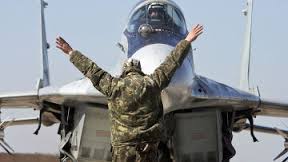Foreign Policy: Putin clips Lukashenka’s wings with air base in Belarus

In attempt to attract foreign investors, Minsk and Brussels negotiated the release of political prisoners imprisoned after 2010 crackdown. Now Lukashenka’s latest gambit may have played itself out.
Aliaksandr Lukashenka, Belarus’s autocratic president, has earned a reputation over his 20 years in power for playing Moscow and Brussels off each other for financial assistance and political cover. But with Russia finally set to build an air base there, Lukashenka’s days of weaving between Russia and the West, and extracting benefits from both, may be over.
The decision to build the base, which will be close to the border with NATO member Lithuania, was announced over the weekend and comes as Russian President Vladimir Putin tries to restore his country’s lost great power status and rebuild its military capabilities abroad. For Belarus, the plans to establish the base come in a particularly tense period of relations between Minsk and Moscow, fueled by Russia’s annexation of Crimea and the subsequent war in Ukraine.
Wary of its eastern neighbor, the Belarusian leader embarked in late 2014 on an unprecedented tilt away from Moscow, threatening to leave the Russian-led Eurasian Union and adopting a new military doctrine that warned of “little green men,” like those who appeared in Crimea before it became part of Russia. Belarus has also tried to rebuild relations with the EU, which, as Reuters reported on Sept. 17, will result in the easing of economic sanctions against Minsk.
But with the new military base, Putin has signalled his desire to keep the unpredictable Lukashenka within the Kremlin’s orbit and avoid a rapprochement between Belarus and the West in the process.
“With the plans for the base going ahead, Lukashenka’s ability to maneuver against Russia is drastically reduced,” Daragh McDowell, an analyst at Verisk Maplecroft, a risk management firm in the United Kingdom, told Foreign Policy. “They can no longer zig and zag between Europe and Russia like they used to.”
Military links between Minsk and Moscow are hardly new. Belarus is a member of the Collective Security Treaty Organization, a military bloc of former Soviet countries, and the Russian military already has a radar station located in the country. But the military base marks a step change for the Russian presence in Belarus, a geopolitically consequential move as tensions continue to rise along NATO’s eastern frontier. Minsk had avoided signing off on the military base since it was first proposed in 2013, in what ultimately was a futile bid to avoid angering the West while keeping maneuvering room with Moscow. After the Ukraine crisis, though, Russia pushed its base plans with renewed zeal.
Since becoming president in 1994 in the wake of the collapse of the Soviet Union, Lukashenka has tried to juggle his country’s de jure independence with the awkward fact that Belarus is economically dependent on Moscow. Russian subsidies form the backbone of the beleaguered Belarusian economy and more than 40 percent of the country’s exports go to Russia. But with the Russian economy also in dire straits, Russian subsidies were reduced and Minsk’s bottom line took a major hit in the last year. With economic collapse looming, the government adopted drastic measures at home, such as prohibiting workers in certain industries from quitting their jobs without approval and imposing fines on the unemployed. Meanwhile, in an attempt to attract foreign investment, Minsk and Brussels negotiated the release of political prisoners imprisoned after the country’s 2010 presidential elections.
Now, though, Lukashenka’s latest gambit may have played itself out.
“Lukashenka doesn’t want to be a Russian puppet, but he wants to stay in power,” Andrew Wilson, the author of Belarus: The Last European Dictatorship, told FP. “In hard power terms, he doesn’t have a lot of freedom to move against Russia. ”
The article was originally published at Foreign Policy
-
03.01
-
07.10
-
22.09
-
17.08
-
12.08
-
30.09








































